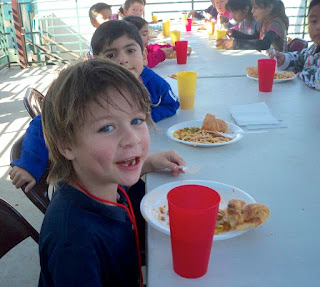
Some children are used to seeing murder—and
I am not referring to what they see on TV. This is especially the case with the
kids in the Orphans First children’s program in Pedregales, a drug-infested
barrio of Tijuana, Mexico where four fatal shootings recently took place—two
directly affecting kids in the program.
In one case the mother of seven kids was shot and killed over a bad drug deal. One of her
sons, David, was shot and killed three years ago at age sixteen. The remaining children
have different fathers and no one knows who or where they are. Most of the
children are now living with their grandmother, Mary.
Some of these children attend the Orphans First program, including nine-year-old
Jennifer who has AIDS and two of her younger brothers. Like most of the kids in
the neighborhood, the children are undernourished. (The meals they receive in
the Orphans First program are probably the only balanced food they eat.)
The Orphans First program director, Deanna, and Calvary Chapel Pedregales,
are doing all they can to help this family in crisis with food and other
necessities as they do for other impoverished neighbors including Lupita and
her three little ones. Lupita, a girl who cleans the property, is another
victim of the recent shootings, which killed her husband.
These murders stress the importance of the Orphans First children’s
program, which provides afterschool tuition, clothes, food, toys, medical
assistance and Bible teaching for some forty kids, and also helps their
families. But there are hundreds more kids who would like to be in the program.
We simply do not have enough help.
For children who attend the program regularly, their chances of a better
future are greatly increased. Biblical teaching, general education as well as
belonging to a solid church community will hopefully aid these little ones to reach
for God’s best and rise beyond the status quo of their environment.
But nothing is simple. Nothing is as it should be. Some kids find it hard
to attend regularly simply because they find themselves having to take care of
younger siblings. And in the case of older kids, they often drop out of the
program when they reach pre or early teen years, drawn away by the world’s
allures.
And, given their surroundings, it is no surprise.
Pedregales
is, after all, an impoverished drug riddled colonias
of Tijuana. The unsanitary conditions of slum homes precariously built onto the
slopes of the ravine (propped up by scraps and old tires) starkly contrast the
view—San Diego high-rise buildings. Unpaved roads, poor drainage and sewage, unreliable
electricity and limited water access contribute to health problems for these impoverished
people who, for the most part, have little access to health care.
To add to
the problem, the local public school lacks quality education and oftentimes
lacks attendance. Kids frequently miss school. Parents are either dysfunctional
owing to alcohol or drugs or just plain overwhelmed trying to survive. “I
didn’t wake up so I didn’t go,” is a frequent comment kids make. No one was
there to wake them. But without education, the children will likely end up like
the adults in the vicinity—trying to make ends meet through prostitution or drug
deals. (Already by age twelve, many children are drawn into this sordid
lifestyle.)
While we
thank God for every child in the Orphans First children’s program in Pedregales—for
the help they receive—it is nonetheless hard not to feel sad knowing hundreds
of others would love to be in the
program and could radically benefit from it. It is also hard to ignore the
plight of those older kids who leave to get caught up in the fray of the drug
rackets. How can we reach them all? How can we do more?
Part of the problem is this: there are simply not enough helping hands to
do more at this time. We
need more full-time workers to take care of these kids—and, of course, funds
are always needed.
No wonder
Scripture teaches, “Ask the Lord of the harvest, therefore, to send out workers
into his harvest field" (Proverbs 9:38).
Orphans
First programs include two children’s programs in Mexico and four children’s
homes in India. Watch the short promo videos and find out more about OrphansFirst here.
Finally, as we pray for these children, let us not
forget kids in America who have been thrown extremely painful situations.
Recently,a six-year-old girl, Lexi, who was ruthlessly removed from her family
in California. Read my article here. Pray and speak up for Lexi by signing the petition here.
May God help us hear His heartbeat and do our
part so that these childen’s lives will be significantly better.
Janey DeMeo M.A.
Copyright © April 2016








